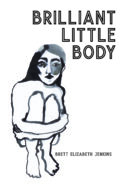 Brett Elizabeth Jenkins
Brett Elizabeth Jenkins
Brilliant Little Body
Riot in Your Throat
Reviewer: Shawn Pavey
Brilliant Little Body is Brett Elizabeth Jenkins’ first full-length collection. This volume, from Riot In Your Throat, is a beautifully designed book with a striking cover image by Beth Madeley. From the opening poem, it becomes evident that what I witnessed at a long-running reading series in Minneapolis in June of 2019 is on full display here: humor – outrageous and often self-deprecating – and artful application of a well-studied sense of poetics. Jenkins’ embrace of the surreal pairs with documenting the all too real struggles: to cover the rent, to navigate relationships, to witness beauty, to fight patriarchal power structures, to make poor decisions, to survive.
The first poem, “A Man in an Illinois Tollbooth Called Me a Beautiful Woman as I Was Driving Away,” begins:
and I turned my car around, jumped into
his small sanctuary, and started a family there
in that small dirty box. We subsist on nickels and rubber
gloves, snips of song lyrics pouring out of sedan
windows. Now, love, love don’t come easy. But
I keep on waiting, anticipating for that soft voice …
Deep in my heart I hope it’s the original “You Can’t Hurry Love” by The Supremes she hears through the tollbooth window and not that saccharine Phil Collins cover; regardless, this is a perfect introduction to this book. The song lyrics are the first injection of pop culture in this collection rife with them, but they are sly. Jenkins keeps the reader’s interest from one line to the next. There is always something heartbreaking or beautiful, an image, an epiphany, a surprising turn of phrase, an instance of gut-wrenching vulnerability. The opening poem concludes:
You’re a beautiful woman he told me, and now we live
in this toll booth collecting coins. Our seven children
tap dance on the median. We sleep in a pile like puppies.
They don’t go to school, but we don’t get in trouble
because the police are scared of our strange family.
Windows open and shut. I’m beautiful. We have all this.
Jenkins wears le théâtre de l’absurde like a second skin. So many of these poems take such wild imaginative leaps, and Jenkins brings us along as she explores ideas of what might be or what she wishes things could be, if only for an instant. A compliment from a tollbooth attendant sends her deep into speculation of what that life could be had she turned around, started that life together. On the surface, we bear witness to Jenkins’ playfulness as a poet. But look at the title and poem again. If the superficially innocuous compliment were a … wolf whistle or cat call, how would this change the poem? Maybe this poem is not the poet’s whimsical imagining but rather “what do you really think would happen, guy?”
Riot In Your Throat is publishing the work of contemporary feminist poets, so it’s important to look at this work through that lens. While this collection does not read like feminist poetry, per se, each poem in Brilliant Little Body is an honest, vulnerable exploration of the poet’s experience as a single, educated woman from a modest upbringing.
There are explorations of the struggles of a working-class life, a marriage that fell apart, relationships that start on fire and end in tears. In the poem “When Non-Poets Ask Me What My Poems Are About,” Jenkins begins:
I usually just say murder. I don’t write about murder
(at least not exclusively) but there is no good way
to tell them, baby, you’re looking at it. My poems
are about my hair, about how it’s been unwashed
since last Friday but I’ll let you run your fingers through it
if you buy me four White Claws and say I’m pretty.
My poetry is about the moon, of course,
because she’s the only fucking rock in our sky—
even space real estate prices are outrageous.
We’ve just met at this bar and there’s no easy way
to slide into a conversation about the winter
I fell through the ice, the dreams I have
about the fog-raked lakes. Every time I forget
to put my turn signal on, it’s a poem, and the time
an old woman flipped me off while wearing mittens,
that was certainly a poem.
Jenkins takes us through her life unflinchingly. The strength of this work lies in its openness and vulnerability and how, even after bad decisions or bouts of self destruction, there’s no wallowing or self-absorption. This is transparent, unapologetic honesty. The images are poetic while the language is coarse. There is a skillful pacing and a composer’s choice of diction. Jenkins is a musician as much as a poet, balancing the staccato with the dolce, creating a mesmerizingly subtle mix of hard consonants softened by long vowels, an interplay of assonance and consonance that give these free verses their engaging rhythms.
This book is about searching, if it is about anything. Searching for meaning, purpose, maybe just a general idea of what to do. Jenkins finds glimpses, but too few. The work illustrates the struggle of the educated creative trying to make it through the day in late-stage capitalism. The speaker of these poems can’t make relationships work. Can’t make jobs work. Can’t make dating work. Where Jenkins succeeds are with these poems. Her collection is so thematically cohesive that the work feels like a book-length poem. Her craft is apparent in every line. There is no pretension or artifice in these poems, though Jenkins still makes her language dance. Brilliant Little Body is a brilliant little collection.

